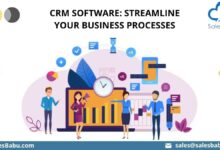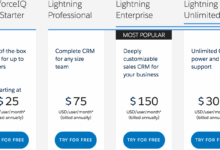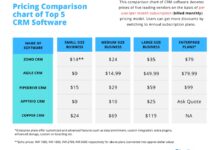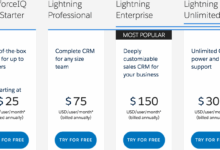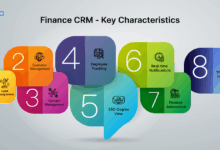CRM for Sales and Marketing Automation: Streamlining Business Processes
CRM for Sales and Marketing Automation is a powerful tool that revolutionizes how businesses handle customer relationships. With its efficiency in streamlining sales and marketing processes, CRM has become a game-changer in the industry.
Introduction to CRM for Sales and Marketing Automation
Customer Relationship Management (CRM) is a technology that helps businesses manage interactions and relationships with potential and current customers. In the context of sales and marketing automation, CRM plays a crucial role in organizing, automating, and synchronizing sales, marketing, customer service, and technical support.
Implementing a CRM system offers numerous benefits for businesses, such as improved customer relationships, better customer data management, increased sales productivity, and enhanced marketing strategies. By centralizing customer information and interactions, CRM systems enable businesses to personalize their marketing efforts, target specific customer segments, and track sales opportunities more effectively.
Streamlining Sales and Marketing Processes
- CRM systems help streamline sales processes by providing a centralized platform for managing leads, contacts, and opportunities. Sales teams can easily track customer interactions, follow-up on leads, and prioritize sales activities based on customer data.
- With CRM, marketing teams can create targeted campaigns, track campaign performance, and analyze customer responses. By integrating CRM with marketing automation tools, businesses can automate marketing workflows, personalize messages, and measure the effectiveness of marketing campaigns.
- CRM systems also facilitate collaboration between sales and marketing teams, allowing them to share valuable customer insights, align strategies, and work towards common revenue goals. This collaboration leads to improved lead generation, better lead nurturing, and ultimately, higher conversion rates.
Key Features of CRM Systems
CRM systems offer a wide range of features designed to streamline sales and marketing processes, enhance customer relationships, and drive business growth. Let’s explore some of the essential features of CRM for sales and marketing automation.
Lead Scoring in CRM Systems
Lead scoring is a crucial feature in CRM systems that allows businesses to prioritize and segment leads based on their level of engagement and likelihood to convert. By assigning scores to leads based on their interactions with marketing campaigns, websites, and sales reps, companies can focus their efforts on leads that are most likely to result in a successful sale.
- Lead scoring helps sales teams identify high-quality leads and prioritize follow-up actions accordingly.
- It enables marketers to tailor their campaigns to target specific segments of leads based on their scores.
- By automating the lead scoring process, CRM systems help optimize sales and marketing efforts, leading to improved conversion rates and revenue growth.
Contact Management in CRM
Contact management is another key feature of CRM systems that allows businesses to store and organize customer information in a centralized database. This feature plays a crucial role in maintaining strong customer relationships and ensuring personalized communication with leads and customers.
- CRM systems centralize contact information, including names, contact details, interactions, and purchase history, for easy access and retrieval.
- Contact management enables sales and marketing teams to track customer interactions, preferences, and behavior to deliver targeted and personalized communication.
- By maintaining accurate and up-to-date contact records, businesses can provide timely and relevant support to customers, leading to increased satisfaction and loyalty.
Integration with Sales and Marketing Tools
Integrating CRM with sales and marketing tools is crucial for streamlining processes and improving efficiency. By connecting CRM systems with various platforms, businesses can enhance customer interactions and drive better results.
Integration with Email Marketing Platforms
- CRM systems can be integrated with email marketing platforms like Mailchimp or Constant Contact to streamline email campaigns.
- This integration allows for seamless synchronization of customer data, enabling personalized and targeted email communication.
- Automated email workflows can be set up based on CRM data, increasing engagement and conversion rates.
Integration with Social Media Marketing Tools
- CRM systems can be connected with social media marketing tools such as Hootsuite or Sprout Social to track customer interactions on social platforms.
- This integration helps in monitoring customer engagement, sentiment analysis, and social media campaigns’ effectiveness.
- Having a unified view of customer interactions across channels enables better customer segmentation and personalized marketing strategies.
Connecting CRM with Analytics Tools
- Integrating CRM with analytics tools like Google Analytics or Tableau provides businesses with valuable insights into customer behavior and campaign performance.
- Data-driven decision-making becomes more accessible with in-depth analytics on customer interactions, lead generation, and ROI.
- By combining CRM data with analytics, businesses can optimize marketing strategies, improve sales forecasting, and enhance overall performance.
Successful CRM Integrations with Customer Service Platforms
- CRM systems can be integrated with customer service platforms like Zendesk or Freshdesk to deliver seamless customer support experiences.
- This integration enables agents to access customer information quickly, leading to personalized and efficient customer service.
- Enhanced communication and collaboration between sales, marketing, and customer service teams result in improved customer satisfaction and retention.
Steps for Integrating CRM with Advertising Platforms
- Integrating CRM with advertising platforms such as Google Ads or Facebook Ads involves syncing customer data for targeted ad campaigns.
- By leveraging CRM insights, businesses can create custom audiences, track ad performance, and measure ROI more effectively.
- This integration helps in aligning marketing efforts with sales goals, optimizing ad spend, and improving conversion rates.
Efficiency of CRM Integration with Marketing Automation Tools
- CRM integration with marketing automation tools like HubSpot or Marketo streamlines lead nurturing, email marketing, and campaign management.
- Automating repetitive tasks, lead scoring, and workflow automation enhances productivity and accelerates the sales cycle.
- By combining CRM data with marketing automation, businesses can deliver personalized content, track customer engagement, and drive revenue growth more effectively.
Customer Relationship Management Strategies
Effective CRM strategies play a crucial role in enhancing customer relationships, ultimately leading to increased customer satisfaction and loyalty. Personalized communication, automation, and targeted approaches are key components in successful CRM strategies.
Personalized Communication through CRM
Personalized communication is a powerful tool in building strong relationships with customers. By leveraging CRM systems, businesses can gather valuable data on customer preferences, behaviors, and interactions. This data can then be used to tailor communication efforts, such as personalized emails, offers, and recommendations. For example, sending personalized birthday greetings or product recommendations based on past purchases can make customers feel valued and understood.
Automation in Nurturing Leads and Managing Interactions
Automation plays a vital role in nurturing leads and managing customer interactions efficiently. CRM systems can automate various tasks, such as sending follow-up emails, scheduling appointments, and tracking customer interactions. By automating these processes, businesses can ensure timely and consistent communication with leads and customers, ultimately improving engagement and satisfaction. Additionally, automation can help streamline workflows, save time, and reduce human error in managing customer relationships.
Data Management and Analysis in CRM
Data management and analysis play a crucial role in optimizing sales and marketing strategies within CRM systems. Let’s delve into the process, importance, and strategies involved in managing data effectively.
Data Collection and Organization Process
- Data collection in CRM systems involves capturing information from various sources such as customer interactions, website visits, social media engagement, and more.
- Organizing this data is essential for easy access and analysis. It can be categorized based on customer demographics, purchase history, preferences, and behavior.
Importance of Data Analysis
- Data analysis helps businesses understand customer behavior, preferences, and trends, enabling them to tailor marketing campaigns and sales strategies accordingly.
- By analyzing data, businesses can identify opportunities for upselling, cross-selling, and personalized customer experiences, leading to increased sales and customer satisfaction.
Setting up a Data Collection Strategy
- Define the key data points to collect based on your business goals and target audience.
- Integrate data collection tools with your CRM system to automate the process and ensure data accuracy.
- Regularly review and update your data collection strategy to adapt to changing customer needs and market trends.
Types of Data and Categorization
- Types of data collected can include contact information, purchase history, communication preferences, social media interactions, and more.
- This data is categorized into structured data (e.g., names, addresses) and unstructured data (e.g., email content, social media comments) for analysis.
Data Cleansing and Validation
- Data cleansing involves removing duplicate, incomplete, or inaccurate data to maintain data quality and integrity within the CRM system.
- Data validation ensures that the information collected is accurate and up-to-date, preventing errors in analysis and decision-making.
Data Visualization for Interpretation
- Data visualization tools such as charts, graphs, and dashboards help interpret CRM data effectively, providing insights at a glance.
- Visual representations of data make it easier to identify patterns, trends, and correlations, aiding in decision-making processes.
Interpreting Customer Behavior Data
- Utilize customer behavior data to understand purchasing patterns, preferences, and engagement levels.
- Segment customers based on their behavior to create targeted marketing campaigns and personalized interactions.
Customization and Scalability of CRM Solutions
Customization and scalability are crucial aspects of CRM systems that can greatly impact the effectiveness of sales and marketing automation for businesses. Let’s delve into the importance of customizable features in CRM systems and how these solutions can scale with business growth.
Importance of Customizable Features
Customizable features in CRM systems are essential as they allow businesses to tailor the software to meet their specific needs and requirements. This ensures that the CRM system aligns with the unique processes and workflows of the organization, leading to increased efficiency and productivity.
- Customizable fields: Businesses can create custom fields in the CRM system to capture unique data points that are relevant to their operations. This customization enables organizations to track and analyze information specific to their industry or target market.
- Workflow automation: CRM systems offer the ability to automate various processes, such as lead nurturing and customer follow-ups, based on predefined rules. Customizing these workflows allows businesses to streamline their operations and improve customer interactions.
- Dashboard customization: Customizable dashboards in CRM systems enable users to display key metrics and reports that are most relevant to their roles. This customization empowers employees to make informed decisions and take actions based on real-time data.
Scalability of CRM Solutions
CRM solutions should be able to scale with business growth to accommodate increasing data volumes, users, and functionalities. Scalability ensures that the CRM system can expand or adapt to the evolving needs of the organization without compromising performance or efficiency.
- Cloud-based CRM solutions: Cloud-based CRM systems offer scalability by allowing businesses to easily add or remove users, storage capacity, and features as needed. This flexibility enables organizations to adjust their CRM usage according to changes in business requirements.
- On-premise CRM solutions: On-premise CRM systems may require additional hardware or software upgrades to scale effectively, which can be more costly and time-consuming compared to cloud-based solutions. The scalability of on-premise CRM systems may be limited by the physical infrastructure of the organization.
Role of CRM Plugins and Extensions
CRM plugins and extensions play a significant role in enhancing the functionality of CRM systems by providing additional features and integrations with third-party tools. These add-ons allow businesses to customize their CRM solutions further and extend their capabilities to meet specific business requirements.
- Email marketing integration: CRM plugins that integrate with email marketing platforms enable businesses to manage and track email campaigns directly from the CRM system. This integration improves marketing automation processes and enhances customer engagement.
- Social media integration: CRM extensions that connect with social media platforms allow businesses to monitor and analyze customer interactions on social channels. This integration provides valuable insights for targeted marketing and personalized communication strategies.
- Reporting and analytics tools: CRM plugins that offer advanced reporting and analytics capabilities empower businesses to gain deep insights into customer behavior, sales performance, and marketing ROI. These tools help organizations make data-driven decisions and optimize their sales and marketing strategies.
CRM Implementation Best Practices
Implementing a CRM system can be a game-changer for your sales and marketing efforts, but it requires careful planning and execution to ensure success. Below are some best practices to guide you through the process:
Step-by-Step Guide for Successful CRM Implementation
- Define Your Objectives: Clearly outline what you want to achieve with the CRM system.
- Choose the Right CRM Solution: Select a system that aligns with your business needs and goals.
- Get Buy-In from Stakeholders: Ensure that key stakeholders are on board with the implementation.
- Customize and Configure: Tailor the CRM system to fit your specific processes and workflows.
- Data Migration: Transfer existing data to the new CRM system accurately and securely.
- Training and Adoption: Provide comprehensive training to users and encourage adoption for maximum effectiveness.
- Continuous Evaluation: Regularly assess the CRM system’s performance and make necessary adjustments.
Common Challenges Faced During CRM Implementation and How to Overcome Them
- Lack of Employee Engagement: Communicate the benefits of the CRM system and involve employees in the implementation process.
- Poor Data Quality: Implement data validation processes and regular data cleaning routines to maintain data accuracy.
- Resistance to Change: Address concerns and provide support to employees to ease the transition to the new system.
- Integration Issues: Ensure seamless integration with existing tools and systems through proper planning and testing.
Importance of User Training and Adoption for Effective CRM Utilization
- Empower Users: Equip employees with the knowledge and skills needed to leverage the CRM system effectively.
- Drive User Adoption: Encourage users to embrace the CRM system by highlighting its benefits and providing ongoing support.
- Enhanced Productivity: Proper training leads to improved efficiency, better customer interactions, and ultimately, increased sales and revenue.
CRM Security and Compliance
In today’s digital landscape, ensuring the security and compliance of customer data in CRM systems is crucial for building trust and maintaining regulatory standards.
Security Measures for Protecting Customer Data
- Implementing encryption protocols to safeguard sensitive information such as customer contact details, purchase history, and communication logs.
- Utilizing access controls to restrict unauthorized users from viewing or modifying customer data, ensuring only authorized personnel can access specific information.
- Regularly updating security patches and software to mitigate vulnerabilities and protect against potential cyber threats.
- Conducting regular security audits and assessments to identify and address any weaknesses in the CRM system’s defenses.
Compliance Requirements for Handling Customer Information
- Adhering to data protection regulations such as GDPR, HIPAA, or CCPA to ensure that customer data is collected, processed, and stored in a lawful and ethical manner.
- Maintaining records of consent from customers regarding the use of their data and providing transparency on how their information is being utilized within the CRM system.
- Creating data retention policies to define the duration for which customer data will be stored and establishing procedures for secure data disposal when no longer needed.
Role of Encryption and Access Controls in Data Security
- Encryption plays a vital role in safeguarding customer data by converting sensitive information into a secure code that can only be decoded with the appropriate key, ensuring confidentiality and integrity.
- Access controls help prevent data breaches by limiting the access rights of users based on their roles and responsibilities, reducing the risk of unauthorized data manipulation or exposure.
- By combining encryption and access controls, CRM systems can create a layered defense mechanism that protects customer data from external threats and internal misuse.
Case Studies
In this section, we will explore real-world examples of companies that have successfully implemented CRM for sales and marketing automation, highlighting the impact on revenue growth, customer retention, and overall business success.
Company A: Boosting Sales with CRM
- Company A, a mid-sized retail business, implemented a CRM system to streamline its sales and marketing processes.
- The CRM solution helped Company A increase its customer engagement and personalize marketing campaigns based on customer data analysis.
- By leveraging CRM data insights, Company A saw a 20% increase in sales revenue within the first year of implementation.
- Challenges faced during the CRM implementation included data migration and training employees on the new system.
- Through dedicated training sessions and ongoing support, Company A was able to overcome these challenges and fully utilize the CRM system.
Company B: Enhancing Customer Relationships through CRM
- Company B, a multinational corporation in the hospitality industry, utilized CRM to enhance customer relationships and drive loyalty programs.
- By analyzing customer feedback and preferences stored in the CRM system, Company B personalized its services and offerings to meet individual customer needs.
- The implementation of CRM at Company B resulted in a 15% increase in customer retention rates and a significant improvement in customer satisfaction scores.
- One of the unique strategies employed by Company B was the integration of social media data into the CRM system to track customer interactions and sentiment.
- Comparatively, small businesses like Company A focused on scalability and customization, while large corporations like Company B emphasized personalization and data-driven decision-making.
Future Trends in CRM Technology
The landscape of CRM technology is constantly evolving, with new trends shaping the way businesses interact with their customers. Let’s delve into some of the upcoming trends that are set to revolutionize CRM systems.
Role of Blockchain Technology in CRM
Blockchain technology is gaining traction in the CRM space due to its ability to enhance data security and transparency. By utilizing decentralized ledgers, CRM systems can ensure that customer data remains secure and tamper-proof, building trust and credibility with customers and stakeholders alike.
Integration of IoT Devices with CRM Platforms
The integration of Internet of Things (IoT) devices with CRM platforms allows businesses to gather real-time customer insights. By collecting data from connected devices, companies can personalize their interactions with customers, anticipate their needs, and provide a seamless experience across all touchpoints.
Use of VR and AR in CRM Applications
Virtual reality (VR) and augmented reality (AR) technologies are being leveraged to enhance customer engagement within CRM applications. By creating immersive and interactive experiences, businesses can forge stronger connections with their customers, drive brand loyalty, and differentiate themselves in a competitive market.
Importance of Data Analytics and Predictive Modeling in CRM
Data analytics and predictive modeling play a crucial role in personalizing customer interactions through CRM solutions. By analyzing vast amounts of customer data, businesses can anticipate behavior, preferences, and trends, enabling them to tailor their marketing strategies and offerings to individual customers.
Ethical Considerations in CRM Technology
As CRM technology continues to advance, ethical considerations surrounding the use of customer data become increasingly important. Businesses must prioritize data privacy, transparency, and consent, ensuring that customer information is handled responsibly and ethically to maintain trust and compliance with regulations.
Comparison of Popular CRM Platforms
When it comes to choosing a CRM platform for your sales and marketing needs, it’s essential to compare the features, pricing models, scalability, and user reviews of leading options like Salesforce, HubSpot, and Zoho.
Features Comparison
- Salesforce: Known for its robust features, Salesforce offers a wide range of tools for sales, marketing, and customer service. It includes lead management, opportunity tracking, email integration, and customizable dashboards.
- HubSpot: HubSpot is popular for its user-friendly interface and all-in-one marketing platform. It provides features like lead nurturing, social media management, email marketing, and analytics to track performance.
- Zoho: Zoho CRM is known for its affordability and customization options. It offers features such as workflow automation, sales forecasting, email integration, and collaboration tools.
Pricing and Scalability
- Salesforce: Salesforce’s pricing model is based on per user/per month and can be costly for small businesses. It is highly scalable, making it suitable for large enterprises with complex CRM needs.
- HubSpot: HubSpot offers a free CRM with additional paid features like marketing automation and sales tools. The pricing is tiered based on the features included, making it flexible for businesses of all sizes.
- Zoho: Zoho CRM provides affordable pricing plans with a free version for up to three users. It offers scalability options to upgrade as your business grows, making it ideal for small to medium-sized businesses.
User Reviews Analysis
- Salesforce: Users praise Salesforce for its extensive features and customization options but note that it can be complex to set up and navigate.
- HubSpot: User reviews highlight HubSpot’s simplicity and integration capabilities, but some users find limitations in customization compared to other platforms.
- Zoho: Zoho CRM receives positive feedback for its affordability and user-friendly interface, although some users mention occasional glitches in the system.
Training and Certification in CRM
Training and certification in Customer Relationship Management (CRM) are essential for sales and marketing professionals to maximize the benefits of CRM systems and improve their skills in managing customer relationships effectively.
The Importance of CRM Training for Sales and Marketing Professionals
- CRM training helps professionals understand the features and functionalities of CRM systems, enabling them to utilize the tools efficiently in their sales and marketing activities.
- Training ensures that users are familiar with best practices in CRM implementation, data management, and analysis, leading to improved customer interactions and increased sales opportunities.
- Continuous training enables professionals to stay updated on the latest trends and technologies in CRM, ensuring they can adapt to changes and optimize their CRM strategies.
Certification Programs Available for CRM Users
- There are various certification programs offered by CRM vendors and third-party organizations that validate the expertise and skills of CRM users.
- Popular CRM certifications include Salesforce Certified Administrator, HubSpot CRM Certification, Microsoft Dynamics CRM Certification, and more.
- These certifications demonstrate a professional’s proficiency in utilizing CRM tools, configuring system settings, managing customer data, and implementing CRM strategies effectively.
The Benefits of Becoming a Certified CRM Administrator or Specialist
- Certified CRM administrators or specialists have a competitive edge in the job market, as employers value professionals with recognized certifications in CRM.
- Certification validates an individual’s expertise in CRM, showcasing their ability to leverage CRM systems to drive sales, improve customer relationships, and enhance marketing campaigns.
- Certified professionals often command higher salaries and career advancement opportunities, as their skills and knowledge in CRM are recognized and respected in the industry.
Industry-specific Applications of CRM
CRM systems play a crucial role in various industries, offering tailored solutions to address specific challenges and opportunities. Let’s delve into how CRM is applied in sectors such as e-commerce, healthcare, and real estate, highlighting the unique benefits and obstacles faced in each industry.
Customized CRM Solutions for E-commerce
E-commerce companies leverage CRM systems to track customer interactions, manage sales pipelines, and personalize marketing campaigns. By analyzing customer data, e-commerce businesses can enhance customer engagement and drive sales. Customized CRM solutions for e-commerce often include features like abandoned cart recovery, customer segmentation, and personalized recommendations.
CRM Strategies in Healthcare
In the healthcare industry, CRM systems are utilized to improve patient relationships, streamline communication between healthcare providers, and enhance patient care. Customized CRM solutions for healthcare organizations focus on patient data management, appointment scheduling, and patient engagement. Data analytics in CRM helps healthcare providers make informed decisions, optimize operations, and deliver personalized care.
Role of CRM in Real Estate
Real estate agencies use CRM systems to manage property listings, track leads, and nurture client relationships. Customized CRM solutions for real estate professionals include features like property matching, automated notifications, and contact management. By integrating CRM with real estate websites and marketing tools, agents can streamline sales processes and provide personalized services to clients.
Data Analytics in Finance, Retail, and Telecommunications
In finance, retail, and telecommunications industries, CRM systems leverage data analytics to gain insights into customer behavior, preferences, and trends. By analyzing customer data, organizations can create targeted marketing campaigns, improve customer service, and drive customer loyalty. AI technologies integrated into CRM systems enhance customer interactions, automate processes, and deliver personalized experiences across industries.
Successful CRM Implementations in Hospitality, Automotive, and Technology
Case studies of successful CRM implementations in sectors like hospitality, automotive, and technology showcase how organizations optimize customer relationships, drive sales, and improve operational efficiency. By customizing CRM solutions to meet industry-specific requirements, businesses can enhance customer satisfaction, increase revenue, and stay competitive in the market.
Tips for Maximizing ROI with CRM
Implementing a CRM system can be a significant investment for any business. To ensure you maximize the return on this investment, consider the following strategies:
Measuring Effectiveness of CRM
- Regularly track key performance indicators (KPIs) related to sales and marketing outcomes.
- Analyze data to measure the impact of CRM on customer acquisition, retention, and overall revenue.
- Utilize customer feedback and surveys to gauge satisfaction and identify areas for improvement.
Ongoing Optimization and Continuous Improvement
- Regularly review and update CRM processes to align with evolving business needs.
- Provide continuous training to employees to ensure they make the most of the CRM system.
- Seek feedback from users to identify pain points and opportunities for enhancement.
Successful ROI Case Studies
- Showcase real-life examples of businesses that have achieved significant ROI through CRM implementation.
- Highlight specific strategies and tactics that led to successful outcomes.
- Illustrate the quantifiable benefits in terms of increased sales, improved customer satisfaction, and streamlined processes.
Data Analysis and Segmentation for Targeted Marketing
- Utilize CRM data to segment customers based on behavior, preferences, and demographics.
- Create targeted marketing campaigns tailored to specific customer segments for higher conversion rates.
- Leverage data analytics tools to optimize marketing strategies and drive personalized interactions.
Integrating CRM with Other Business Systems
- Ensure seamless integration of CRM with tools such as marketing automation platforms, ERP systems, and customer service software.
- Enable data sharing across different systems to provide a comprehensive view of customer interactions.
- Automate workflows and processes to improve efficiency and eliminate manual data entry errors.
Setting Clear KPIs and Metrics
- Define specific, measurable goals for CRM performance, such as increased lead conversion rates or higher customer retention.
- Track metrics regularly and adjust strategies based on performance insights to drive continuous improvement.
- Align KPIs with overall business objectives to ensure CRM efforts contribute to the company’s success.
Closure
In conclusion, CRM for Sales and Marketing Automation offers a seamless way for businesses to manage customer interactions and boost sales. By integrating CRM systems with various tools and implementing effective strategies, companies can achieve significant growth and success.
